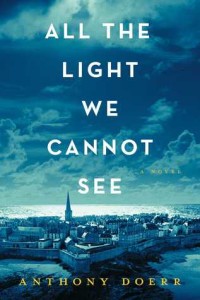Doerr, Anthony (2014). All the Light We Cannot See. New York: Scribner (530 pp).
This novel is is composed of dozens upon dozens of short, one-to-five-page chapters of very digestible, easy to absorb, pleasantly written prose. In the beginning, chapters alternate between two characters’ points of view, a 14-year-old girl living in Paris in 1944, and an 18-year-old, German boy living in northeastern France. She is blind; he is gifted at building and fixing radios. As the Nazis invade, she and her father flee to the west coast, he joins the Hitler youth.
As the war progresses, the short chapters start to include other points of view, such as the young man’s superior officers, the girl’s father and uncle, but those two youths remain the main characters, even though they don’t meet until over 400 pages into the book. Instead, the short, alternating chapters make them close and somehow connected in the reader’s mind, and since the story is sentimental, you know they must meet eventually, even though they are not even aware of each other’s existence. The reader, not the characters, supplies the emotional glue that binds these two over the pages and over the war years, and that’s a neat narrative trick.
When the two principals do finally meet however, the interaction is extremely abrupt, tentative, and truncated. Barely a dozen words are spoken and the story suddenly fast-forwards thirty years into the future. For me, that was an awfully long way to go for no payoff.
There is a sentimental, contrived story about a rare, centuries-old diamond with a curse on it that serves as a Hitchcockian MaGuffin. The girl has it; the Nazis want it. But unlike a true MaGuffin, it evaporates into irrelevance. There’s another long journey with no proper end.
The story line is severely chopped up, not by the POV shifts, but by time cuts. The story jumps ahead several years or months, then back to a previous period, then forward, then back, all this for no purpose except to avert boredom by introducing artificial suspense where none actually exists in the story. I found these jumps unnecessary and annoying.
On the plus side, the writing is thoughtful, with bright, clear imagery, even though one of the main characters is blind. Cliches and stereotypes are scarce, despite the sentimental scenes, so the writing has a freshness that pulls you through the pages, at least to the inevitably saggy midpoint, where in a 500-page book with no substantial plot, you realize that nothing is going to happen. At least the short chapters and changing POVs keep you from getting too bored.
All told, it’s a World War Two story with nothing new to say. Germans: bad. French: good. Bombs: awful. Suffering: painful. There is a wisp of insight at the end, when the surviving characters are elderly adults, enjoying children and grandchildren in comfortable postwar worlds. Questions, references, and memories of the war come up, but they cannot be communicated to succeeding generations, and have become only faded dreams even to the survivors, as time and change inexorably obliterate even the most intense memories and meanings.
That’s a useful observation about life, not just about WWII. Personally, I’ve had it up to here with Nazis and would have preferred that the novel were set in a less shopworn period, but the war does import built-in, easily recognizable conflict, sparing the author the trouble of having to create it.
As for the power of marketing, this slightly-above-average novel made the New York Times’ Top 10 for 2014, was a National Book Award Finalist, and a 2015 Pulitzer Prize winner. Nice work.

